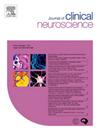Do gastrointestinal symptoms influence neurocognitive functioning in COVID-19 patients?
IF 1.9
4区 医学
Q3 CLINICAL NEUROLOGY
引用次数: 0
Abstract
Background and objectives
SARS-Cov-19 virus is known to attack multiple organ systems including the brain and as a result, numerous of these patients manifest neurocognitive disorders. Moreover COVID-19, causes gastrointestinal symptoms such as nausea and vomiting, abdominal pain, diarrhea or constipation, loss of appetite and weight loss and these symptoms have been linked to neurocognitive dysfunction. According to studies, COVID-19 patients who report gastrointestinal symptoms as the predominant manifestations, perform worse on neurocognitive tests than those who do not suffer from such symptoms. In this study, we examined whether hospitalized COVID-19 patients with gastrointestinal symptoms presented neurocognitive dysfunction.
Materials and methods
The study enrolled 92 COVID-19 patients, hospitalized for 6–20 days, who were divided into 2 groups: the gastrointestinal group (GI) (n = 44) who presented with predominant gastrointestinal symptoms such as anorexia, nausea, vomiting, diarrhea and abdominal pain and the group without GI symptoms, (nGI) (n = 48), who reported fever, fatigue and symptoms from the respiratory system as the main symptoms. Neurocognitive assessment was performed by questionnaires administered to all patients, three months after the first positive PCR test for COVID-19.
Results
T-test was conducted for each test. Results revealed that patients with GI symptoms had significantly lower performance on neuropsychological functions such as complex scanning and long-term memory, visuospatial perception, executive function, verbal working memory and short-term memory, compared to patients without GI symptoms.
Conclusions
We found that there was a significant relationship between cognitive function and GI symptoms. This indicates that COVID-19 patients with GI symptoms may be at increased risk for developing deficits with their memory and other aspects of cognition.
求助全文
约1分钟内获得全文
求助全文
来源期刊

Journal of Clinical Neuroscience
医学-临床神经学
CiteScore
4.50
自引率
0.00%
发文量
402
审稿时长
40 days
期刊介绍:
This International journal, Journal of Clinical Neuroscience, publishes articles on clinical neurosurgery and neurology and the related neurosciences such as neuro-pathology, neuro-radiology, neuro-ophthalmology and neuro-physiology.
The journal has a broad International perspective, and emphasises the advances occurring in Asia, the Pacific Rim region, Europe and North America. The Journal acts as a focus for publication of major clinical and laboratory research, as well as publishing solicited manuscripts on specific subjects from experts, case reports and other information of interest to clinicians working in the clinical neurosciences.
 求助内容:
求助内容: 应助结果提醒方式:
应助结果提醒方式:


